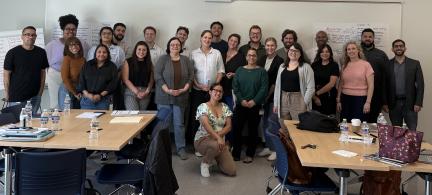
Building Shared Capacity
At the Leonard Parker Pool Institute for Health (LPPIH), our work includes both holistic neighborhood development and capacity building. Holistic neighborhood development allows us to go deep within our place-based efforts in the Franklin Park neighborhood to solve complex issues that prevent residents from thriving. Capacity building is about helping local leaders work across sectors – such as education and health – and learn from the national best practices behind our health and well-being strategies.
Hands-on results training
Getting results was identified as a gap in our community and an area where training could be provided locally. As a result, LPPIH convened more than 20 cross-sector community leaders for a powerful four-session workshop on Results Based Facilitation (RBF), which is a method for “getting different and better results for work.”
This interactive series was hosted in partnership with StriveTogether, a national network of community partnerships that joins neighbors, nonprofits, businesses and schools to work toward a future where youth can thrive in their shared communities. The sessions provided our partners with an online training hub and energetic, hands-on training to learn and earn certification in RBF.
StriveTogether supports communities working to put more young people on a path to economic mobility. Its approach – rooted in data, collaboration and equitable outcomes – aligns with LPPIH’s goals. StriveTogether brought expert facilitators Shannon Scott and Raquel Donoso to Allentown to lead participants through a transformative journey of personal and professional growth.
How does RBF get results?
The RBF model focuses on moving groups from conversation to action. It equips participants with six key competencies, including holding productive roles, facilitating inclusive conversations and leading meetings with purpose, which improve how people engage in meetings and build accountability for results. For LPPIH, this training wasn’t just a skills workshop; it was a strategic investment in the community’s collective capacity to address challenges collaboratively.
“Standing in front of a group and helping that collective come to shared decisions can be a challenge,” says Samantha Shaak, Executive Director of LPPIH. “We’ve all been in meetings where the conversation goes off task or where people leave feeling unheard. RBF offers a way to structure meetings so they’re more productive and inclusive – so people leave with a clear plan and a sense of momentum. This training helps us fill in the gaps in shared skills and language across sectors.”
A diverse group of leaders from schools, nonprofits, youth programs and local government filled the room. Among them was Karim Brown, a school parent liaison with the Allentown School District. With more than 15 years of experience in the district, Brown welcomed the chance to sharpen her skills alongside both familiar faces and emerging community voices.
“This training taught me how to actually be a facilitator: how to start a meeting, read the room and make sure the group gets to a solution,” Brown says. “Even when I’m not leading the meeting, I can help bring things back on track to make sure we accomplish something.”
Brown also appreciated the chance to connect with newer members of the local community. “It’s been refreshing to see new faces – young faces – who are going to carry this work forward,” she says. “There’s a lot of value in having us all in the same room learning together.”
That collaborative spirit was echoed by Maddie Marte, Director of Administration and Impact at Community Bike Works. “I really enjoyed getting to know people from different organizations I don’t typically work with,” she says. “And the check-ins at the start and end of each session helped us feel grounded and connected.”
Marte shared that the training changed how she views meetings. “I’m usually a participant, not a facilitator. But now I’m noticing who’s playing which roles in the room – who’s the convener, the note-taker, the neutral facilitator,” she says. “It’s giving me a new lens and helping me think about how I can contribute, even if I’m not leading.”
New skills and tools
One of the culminating activities in the final session involved teams proposing ideas using the RBF framework, then voting and collaborating to refine the proposals. It was a real-time demonstration of RBF in action: respectful listening, thoughtful inquiry and convergence toward shared action.
As the final workshop wrapped up, participants walked away with strengthened skills and new tools to use within their work in their organizations and in the community. They also gained new and deepened relationships with colleagues from all different areas.
For LPPIH, this is just one example of how national best practices can be adapted locally to empower communities. Shaak was in awe of the group and how participants quickly engaged in the training. “From the moment people walked into the room, the energy was one of joy and curiosity. They were excited to learn together, and that energy carried through each session,” she says. “Relationships that existed before this training were deepened, and new ones were formed. That’s what makes this work meaningful.
“We hope this is just one of many opportunities to grow our collective capacity,” Shaak adds. “Because when we work together – with shared language, trust and clear goals – we’re not just holding better meetings. We’re building a healthier, more connected Allentown.”
Through our growing partnership with StriveTogether, LPPIH is excited to continue learning from national leaders while bringing those lessons home to strengthen the bonds and opportunities within our own community.
